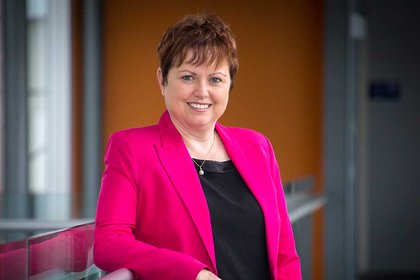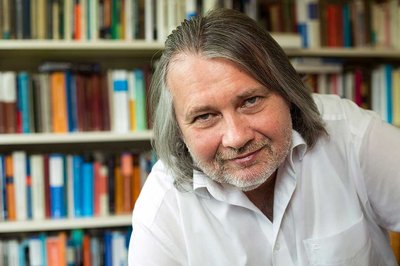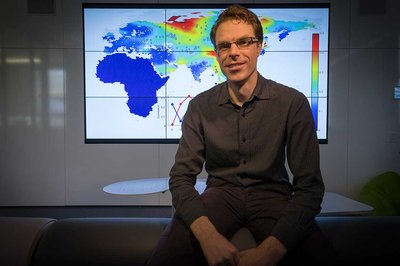
Vice-Chancellor Professor Jan Thomas.
Massey researchers have received more than $15.6 million from the Royal Society of New Zealand's annual Marsden Fund for 26 projects, a record number of projects funded and total funding.
The projects include studying super-heavy elements, Māori resilience in post-disaster contexts and sexuality and ethical deliberation in residential aged care.
The 26 successful Marsden grants – made up of 10 “Fast-Start” grants for new and emerging researchers and 16 standard grants – represent 18.4 per cent of the total $84.6 million funding pool this year.
Vice-Chancellor Professor Jan Thomas congratulated the researchers. “This is a tremendous effort and outcome, not only by our world-class researchers but also the many academics and support staff they work with whose contribution is so vital to ensure the quality and impact of the research proposals are prioritised through the various stages of the process,” Professor Thomas says. “Competition for research funding is intense in the New Zealand research environment. The 133 projects selected to receive funding nationwide were chosen from more than 1000 preliminary proposals.”
Assistant Vice-Chancellor Research, Academic and Enterprise Professor Giselle Byrnes says success in this Marsden round showcases the research Massey is known for, tackling the big issues and wicked problems the world is facing and doing this within a rigorous and scholarly context. “The range and diversity of the research projects also showcases the extent of Massey’s broad research expertise,” Professor Byrnes says.
The College of Sciences received grants for an unprecedented 21 projects, which shared more than $12 million of the funding.
One of the projects will be led by Distinguished Professor Peter Schwerdtfeger of the New Zealand Institute for Advanced Study. It receives $910,000 to explore the heaviest elements in the periodic table.
“Super heavy elements with an atomic number between 113 [Nihonium] and 118 [Oganesson] have only very recently been added to the periodic table and given names. Exploring and extending the periodic table of elements towards the super-heavy region, with atomic numbers larger than 103 is driven by the desire to test the very limits of the existence of matter,” Professor Schwerdtfeger says.
The complex electronic and nucleonic structures require state-of-the-art quantum theoretical approaches due to the huge electric fields involved, which the project proposes to develop and apply, he says.
“A wealth of entirely new phenomena awaits discovery due to the interplay between relativistic electrons and nucleons moving in quantal orbits subject to very strong electrostatic repulsion. Theoretical calculations of chemical and physical behaviour are indispensable to guide, design, and explain the one-atom-at-a-time experiments at the yet-unexplored regime of mass and charge.”

Distinguished Professor Schwerdtfeger.
Successful projects
Living wages, disaster management, bacteria’s memory and DNA diversity – School of Psychology
The College of Humanities and Social Sciences had another strong year with four projects sharing over $2 million. One successful project, Living wages: Transforming lives, transforming work?, received $845,000 and will be led by Professor Stuart Carr of the School of Psychology and Professor Jim Arrowsmith and Professor Jane Parker from the Massey Business School.
The research aims to inform public deliberations on living wages in an age of societal and organisational transformation. It will consider diverse perspectives of employers and employees.
Māori, Catastrophic Events, and Collective Development of Culture-based Disaster Management Theory and Practice – School of Psychology.
Senior lecturer in indigenous disaster management Dr Christine Kenney receives a Fast-Start grant of $300,000 to explore Māori resilience in post-disaster contexts. The research pioneers Māori disaster management theory through exploring how Māori attributes can act as cultural technologies to manage catastrophic disasters. These attributes will be theorised and assembled within a disaster management framework that is culturally acceptable and widely applicable.
What counts as consent? Sexuality and ethical deliberation in residential aged care – School of Social Work
A project led by Associate Professor Mark Henrickson will receive $845,000 to study sexuality and ethical deliberation in residential aged care. The project will contribute to ethical theory in practice by interrogating and informing conceptualisations of consent in the domain of sexuality and intimacy in residential aged care. It will identify practice implications by interviewing staff, residents and family of residents.
Stuff Memories Are Made Of: How Bacteria Remember and Learn from Environmental Signals –Institute of Natural and Mathematical Sciences
Dr Olin Silander will lead a project that receives $895,000 to look at the memory of bacteria. Bacterial growth rates and death rates depend critically on the way they respond to changes in environmental conditions. For example, they may employ different stress responses to survive antibiotic treatment. This phenomenon – when previous experiences affect future behaviour – is commonly referred to as memory.
The team will quantitatively measure the effects of bacterial memory on growth and survival, using a range of approaches to understand when memories are formed and what affects the length of time they are maintained. This work will give them novel insight into the effects and mechanisms of memory in bacterial cells
From genotypes to phenotypes: Quantifying the functional load – Institute of Fundamental Sciences
Professor Murray Cox will lead a project that receives $925,000 to look at our biggest genetic questions. “We now have a good understanding of genetic diversity within species, especially in humans,” Professor Cox says. “Simply describing diversity was never the main goal of genetics…the question was always bigger: What fraction of genetic change actually causes a corresponding change in phenotype?”
The research proposes to offer a more representative picture of human diversity, with immediate downstream relevance to the history and health of Pacific peoples by looking at small traditional villages in eastern Indonesia. It will analyse and quantify how much DNA diversity has functional effects. This will provide evolutionary insight into the genome dynamics of traditional human populations within the kinds of small community networks where most human evolution historically occurred.

Professor Cox.
The greedy algae that are great for our environment: why do they pay an energy penalty to gorge phosphate? - School of Engineering and Advanced Technology.
Professor Benoit Guieysse will lead a project that receives $920,000 to look at the mysteries surrounding polyphosphate. Polyphosphate is found in all organisms and is involved in functions such as energy and phosphorus storage and stress response in bacteria. The project seeks to investigate the evolutionary, ecological, and industrial implications of this metabolism.
Improved modelling in evolutionary transcriptomics and proteomics will advance understanding of plant adaptation – Institute of Fundamental Sciences
Professor Peter Lockhart receives $925,000 to lead a project looking at plant adaptation in New Zealand and the effects of climate change on New Zealand alpine flora. The study will look at whether evolution can keep pace with climate change, which in part depends on how fast plant species evolve to occupy the available environmental niches. The proposal seeks to better understand current physiological responses and investigate how and why these physiologies evolved.
Biodiversity and the ecology of emerging infectious diseases – Institute of Natural and Mathematical Sciences
Professor Mick Roberts will lead a project team that receives $415,000 look at the emergence of infectious diseases in relation to climate change. Their goal is to understand the dynamics of emerging pathogens and to recognise patterns in these dynamics that could serve as early warnings of an epidemic. By combining ecological and epidemiological models, researchers will describe how changes in ecosystems may precipitate epidemics, how an infectious disease may change the ecosystem balance, and how evolving pathogens may also precipitate epidemics.
Other successful projects:
- Professor Doug Armstrong ($870,000) – Is individual variation relevant to population dynamics?
- Professor Stephen Marsland ($880,000) – AviaNZ: Making Sure New Zealand Birds Are Heard
- Associate Professor Georg Zellmer ($832,000) – Water in spinel: a robust hygrometer for the Earth and Planetary Sciences
- Dr Helen Fitzsimons ($795,000) – A new role for HDAC4 in neuronal morphogenesis and memory
- Professor Thomas Pfeiffer ($735,000) – Predict to decide: Investigating decision markets in theory, experiments and practical applications
- Professor Carlo Laing ($670,000) – Function from structure: accurate reduced models of neuronal networks
- Associate Professor Adriane Rini ($630,000) – The Logic of Ordinary Language
- Professor Martin Hazelton ($535,000) – Lattice polytope samplers: theory, methods and applications
- Dr Sharon McLennan ($300,000) – Multiple coincidences: Cuban medical cooperation in the Pacific
- Dr Luke Fullard ($300,000) – Understanding friction in granular mixtures: an experimental and modelling study
- Dr Carl Mesarich ($300,000) – Making the switch: cell surface modifications that enable plant-pathogenic fungi to differentiate and maintain infection-related cellular morphotypes during host colonization
- Dr Miao Qiao ($300,000) – Subgraph Matching: Theory and Practice
- Dr Emilia Nowak ($300,000) – Encapsulation of an aqueous liquid in a drop of aqueous liquid
- Dr Ebubekir Avci ($300,000) – Optical Nano-Machines to Study Single-Molecules
- Dr Alastair Clement ($300,000) – Sea-level is not level: unraveling the drivers of spatial and temporal variations in past sea-level changes around the New Zealand coast
- Dr Xiaofeng Zhu ($300,000) – Pattern Discovery from Big Medical Data
- Dr Honour McCann ($300,000) – Population Genomics of an Emergent Plant Infectious Disease